How (and where) to do wine
From my favorite experts + an undisputed affordable wine list in NYC
Food makes sense to me. I understand flavor profiles and palates. I know what ingredients complement each other, what herbs to use on which dish, the ideal ratio for salad dressing. I know how to combine spices and fruits in baked goods, and what does, and doesn’t, need an extra pinch of salt. If you blindfolded me and handed me a plate and a fork, I am confident I could tell you every ingredient given to me with 90%+ accuracy.
Wine is an entirely different story. While my preferred outing is a leisurely bottle of wine over a nice, long dinner, there is nothing more humbling than picking up a wine list, recognizing zero of the words, and asking the waiter to describe, in detail, every single option so you can make an informed decision on your $16 glass. I’ve learned to pay attention to my tastes and have a very vague way of describing wine I like, which has become a somewhat foolproof method for getting something that matches my tastes. I like weird, extra funky natural wines. I like when they are salty and minerally. I like tannins, I like dry, and a little bit of juicy fruit going on. That is usually a good starting point (or just two of those adjectives) to be directed somewhere delicious.
One of my goals for vacation in Paris was to take as many notes on the wine I was drinking (and loving) as possible. I took pictures of every bottle, noted my favorites, and was paying maybe an egregious amount of attention to what each glass tasted like. Things I learned I like: a Riesling from Alsace, France, a Macabeo Pet Nat, a Loire Valley Pinot Noir, and a Jacquère orange.
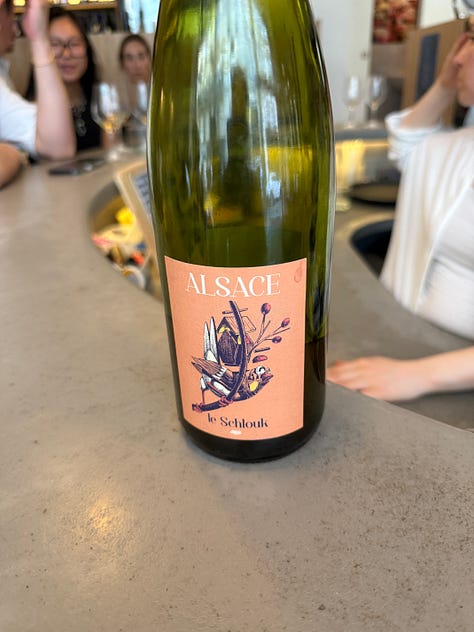
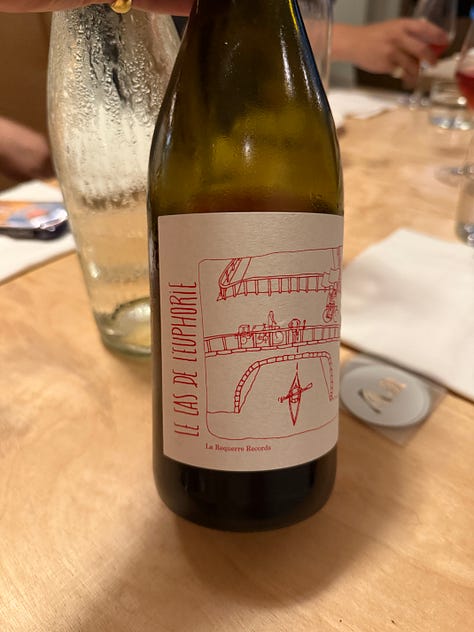
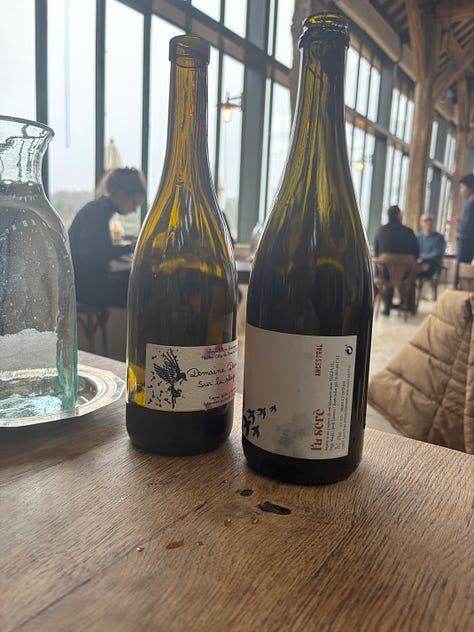
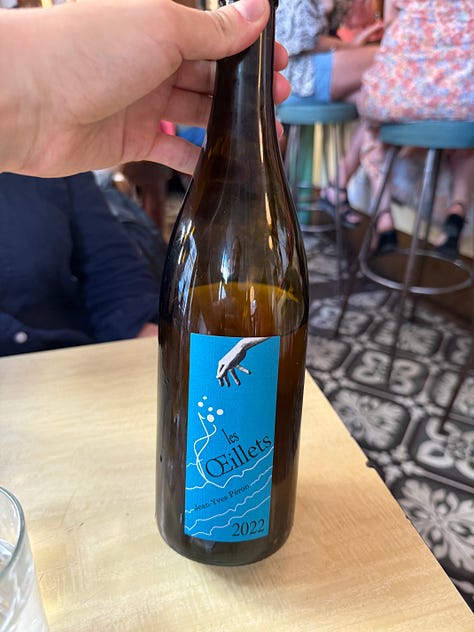
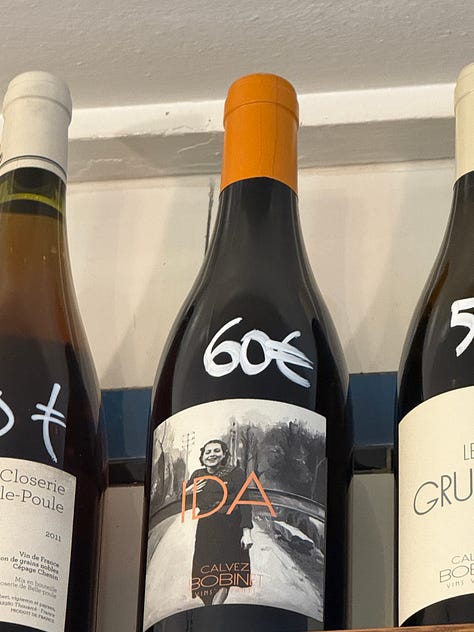
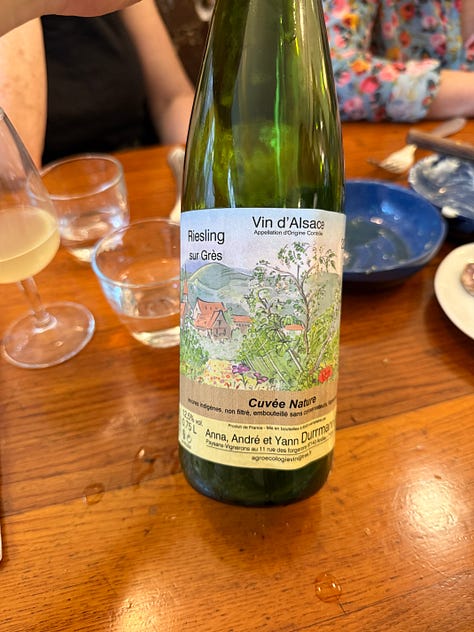
These things that I do know about what I like, about grapes and regions and flavors, is so incredibly minimal. This is a result of absolutely no education, and a lot of trial and error. So, I brought in the experts. One of the best resources I have found so far is my friend
, who writes Wines We Wuv. She is a badass sommelier and industry pro working at Domaine LA in West Hollywood. Her Substack has really inspired my desire to get into wine in a more legitimate way.I’ve also asked my two other wine connoisseur friends for their takes: Christine (Chrust) Choi, industry aficionado, knower of literally all things wine, and officially one of the coolest people I have ever met; and Dustin Morris, expert server at Entre Nous and general genius and perfect person. I’ve asked the pros to give me a little rundown on how they got into wine, and how they’d suggest anyone interested can do the same. Stay tuned for favorite wine lists, wine stores, bottles…
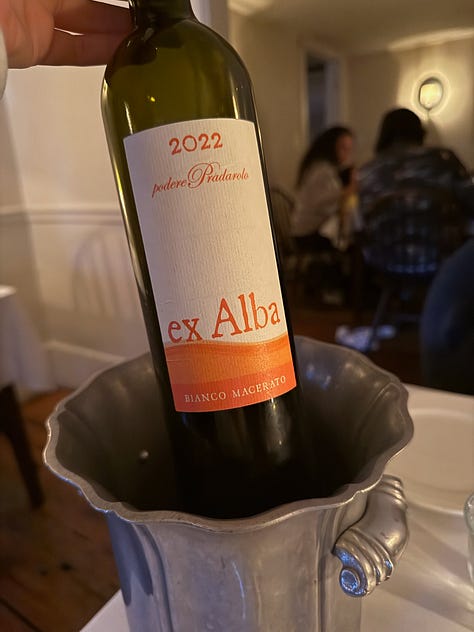
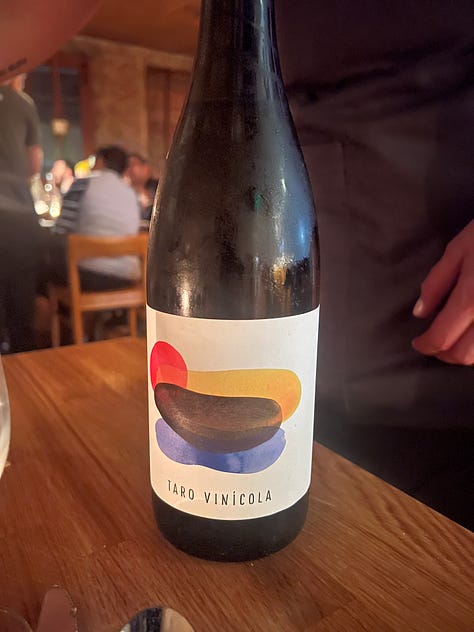
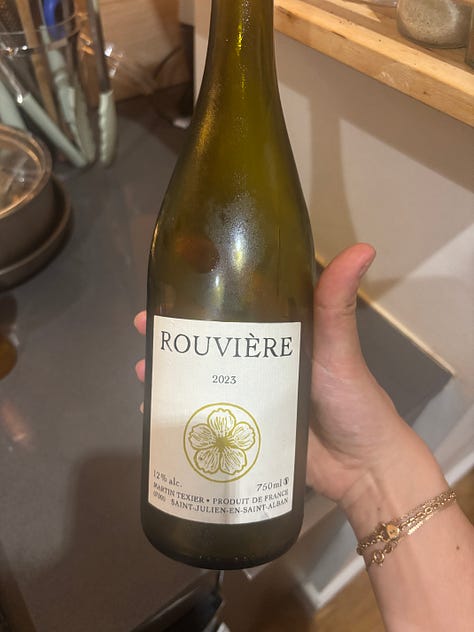
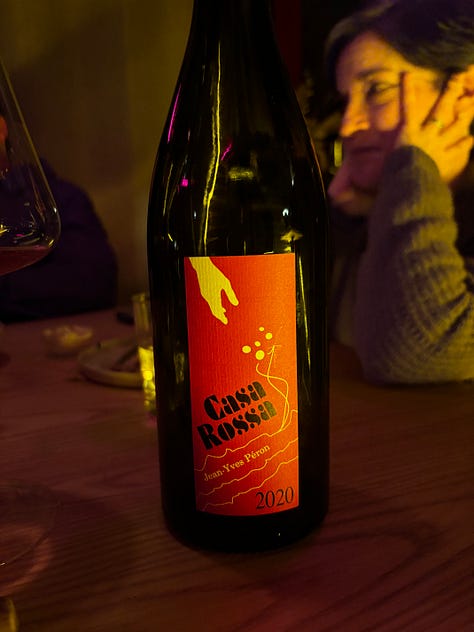
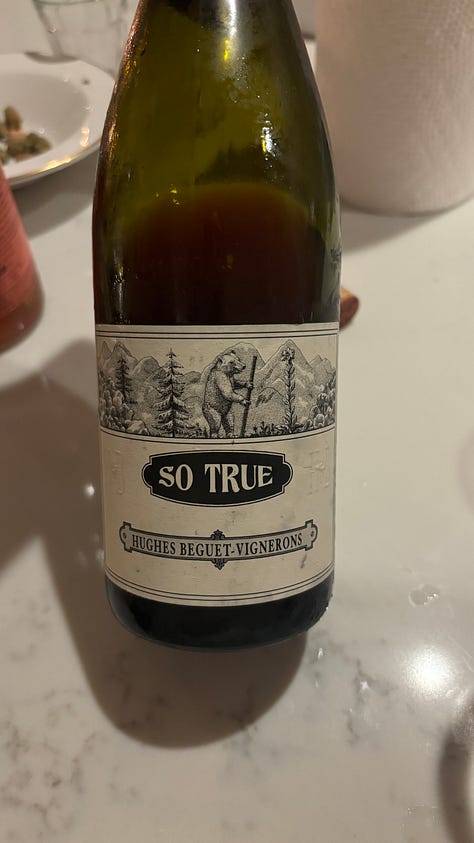
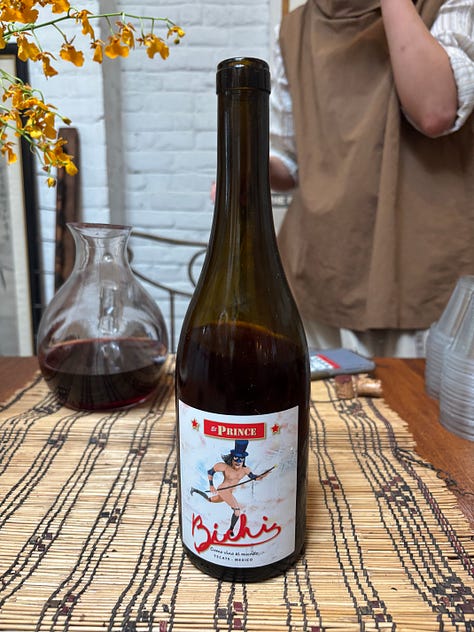
When did wine pique your interest?
Princie: When Covid hit, I’d scroll Spotify for new podcasts on my egregiously long walks. Having lived and breathed restaurants and food news since forever, my algorithm pushed F&B podcasts my way. One that caught my eye was Helen Johannesen’s Wine Face. I knew of Helen through her partnership with Jon & Vinny’s (which had more street cred then), so I thought—why not listen to an episode about wine linked to a cool restaurant?
I was hooked after episode one and finished the entire series. From there, my fascination went wild: buying books about wine, ordering bottles for home delivery during lockdowns, drinking them at home. I honestly thought it would be a Covid hobby, but obviously, it’s become something much bigger.
Dustin: I got started in the service industry through coffee— I was a barista at the donut mogul that is Sidecar Doughuts in LA (IYKYK), and I found out…you could make more money at a restaurant. The first restaurant I worked at had a big natural wine program, and I met somms who were my age and, like, totally normal (shout out Princie Kim), which definitely helped demystify the wine world a little bit. From there, I moved to NYC, fell in love with the restaurant industry, and found that through wine I could garner my own little expertise.
Chrust: I don’t know exactly when I got interested in natural wine, but I attribute a lot of the credit to my friend Anja. Sometime after I graduated from four years of Franzia and Bud Heavy, she introduced me to what good wine could actually taste like.
How/where/from whom do you feel like you got your wine education?
Princie: Books and podcasts were my starting point. Helen’s podcast hooked me, and the first books I read were Wine Folly and Wine Simple—both great, digestible intros.
From there, I owe my wine knowledge to the people I’ve met in the industry. From my first assistant sommelier job at Jon & Vinny’s straight out of college to pouring tastings at Domaine LA now, I’ve been lucky to work with people who also love to nerd out and share all the random shit they know. My taste is truly a patchwork of the mentors and friends I’ve met along the way.
From there, I’ve relied on myself to fill in the gaps.
Dustin: I gotta give it up to Place des Fêtes — the head somm there, Kenny Toll, led wine classes for the team. From there, the GM at Sailor, Luke Sullivan, gave me a lot of confidence about being a young person getting into wine, and Allie and Clem at Entre Nous have an insane breadth of knowledge and just have so many relationships and connections to people in this world that I really look up to.
Chrust: I spent a lot of my time after work loitering at wine stores, asking questions and going to free tastings. I took notes every time, I took photos of bottles I tried, and I asked a lot of questions. My wine education wasn’t particularly romantic or sexy, but I’m glad I put the time in.
Ultimately, I think people just want to feel confident in their ordering, and know that they are going to get a bottle or a glass they will love. How would you suggest someone starts learning about wine and what they like? Are there specific aspects of that learning curve that feel especially important to you?
Princie: This might sound obnoxious, but the first step is simply to drink and taste a wide variety of wine. You won’t know what you like or dislike if you haven’t tried it! And as you drink more, you’ll notice what styles you gravitate toward.
But it’s not just about drinking—it’s taking an extra minute to think about what you like or dislike, and logging that knowledge mentally or on paper. That takes more effort than just swigging down a bottle, but you get out what you put in.
One big reason people find wine intimidating is the vocabulary. I’d hear words like mineral, tannic, carbonic maceration, élévage, and just think—I don’t know what the fuck you’re talking about. Unless you’re working in the industry, you don’t need all the complex terms. But you do need enough language to describe what you enjoy.
The best way to develop that vocab is by asking your somm or server! If you loved a Beaujolais but can’t explain why, tell them that. A good somm will put words to what you’re tasting. Those words become part of your mental wine lexicon for next time.
Dustin: If you're a casual wine drinker at a restaurant, try to describe what you like—it helps a lot even if it's hard at first. Words like “bright acid” or “earthy” go a long way.
If you want to learn more, there are great resources: Wine Folly is super digestible, with graphics, maps, and tasting grids that help you understand grapes.
Podcasts are great too. Disgorgeous is a fun one—it’s interviews with NYC wine pros, blind tastings, themed episodes (like Star Wars wines).
But honestly, the biggest thing is just drinking wine. Go to a shop you think is cool and talk to the people there. Ask what they're drinking. You'll try stuff you wouldn’t have thought of. Instead of always buying the same grape, tell them what you like and let them suggest something new. And yeah, if you're really into it—read stuff. But also, who’s got the time?
Chrust: Try wines. Even if you use a spit bucket, try wines. Try different grapes, different producers, different regions, and ask questions. Wine feels inaccessible sometimes, and I get that. It’s expensive and listening to wineheads talking to wineheads makes you want to talk about politics. I get it, and it’s annoying, but since people in wine love talking about wine, if you ask them a question about wine over a glass of wine—you’re set.
In regards to a learning curve I’d just say: Don’t get intimidated. Wine is centered around the idea of community and celebration. It’s designed to be a tableside production—the uncorking and pouring of wine is what it’s all about. It’s meant for everyone, so don’t let stupid jargon get in your way.
What do you think is the biggest barrier to people learning about/understanding wine?
Princie: Having a static approach to wine drinking. I get that humans are creatures of habit—once they find a wine they like, they buy the same bottle over and over. There’s comfort in knowing you won’t be disappointed, but that’s a surefire way to stunt your growth.
The wine world is so vast that even if you drank a different bottle every night for the rest of your life, there’d still be more to try. There’s so much fun in tasting something entirely new. Is there a chance you won’t like it? 100%. But to understand wine holistically, you have to be open to trying different types, regions, grapes, and techniques.
Dustin: Price is a big one. People think good wine has to be expensive, but that’s not true. There’s great affordable wine. Instead of grabbing the cheapest thing at Trader Joe’s, go to a smaller shop that’s more intentional about buying interesting stuff at every price point.
Another barrier is pretentiousness. Wine is huge and overwhelming, and it can feel like you’ll never know everything—which is true! But that’s okay. There will always be someone who knows more, and that’s good because you can learn.
Selling wine isn’t about pushing the most expensive or “best” thing, but about finding something that fits the person. Everyone just wants to be happy and have fun. So yeah—drink more. That’s good advice for everyone.
Chrust: Like I mentioned before, the intimidation factor is a big thing. It’s intimidating, in the same way that starting out in any new industry is intimidating. But ultimately wine has been around for a very long time and it’s always been meant to create community. It’s just our job to participate.
Other than that, I’d say money is the biggest barrier. Wine is expensive, especially in New York. A glass will cost you about the same as a strong cocktail, but will only get you half as drunk. And once you get your hands on a bottle list—oof. I don’t really have a solution to this. Make more money, have rich friends, or honestly be my friend. Because I have a hard time spending money on a trip to urgent care, but spending 800$ on a bottle of Kenjiro Kagami seems reasonable to me.
What restaurants or bars have your favorite wine lists?
Princie: I’m not just saying this because I used to work here, but I think Stir Crazy in LA really does have an incredible wine list. Mackenzie Hoffman is the mastermind behind the selection. The way that her intellect and incredible palate coalesce into this beautiful book of wines is the eighth wonder of the world.
Recently, I’ve been feeling the list at the newer-opened Baby Bistro in LA’s Historic Filipinotown. Really different from Stir Crazy, it’s relatively concise and more focused on domestic producers. It has intention and a strong point of view but with enough optionality that guests with ranging tastes can find something they’ll like. Wine-bar-wise, I really love El Prado in Echo Park and Cafe Triste in Chinatown.
In New York, I’m obsessed with Ops’ wine list. I really love the list at Place des Fêtes with their Spanish focus. Also was a fan of Dame’s list and Bar Bête’s when I was last dining there!
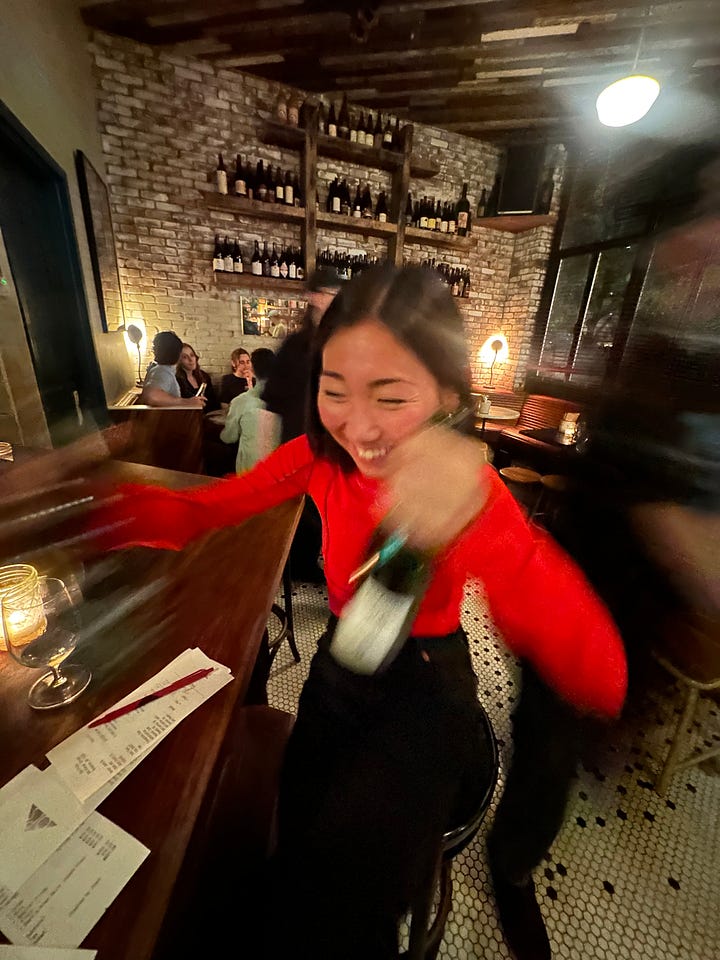
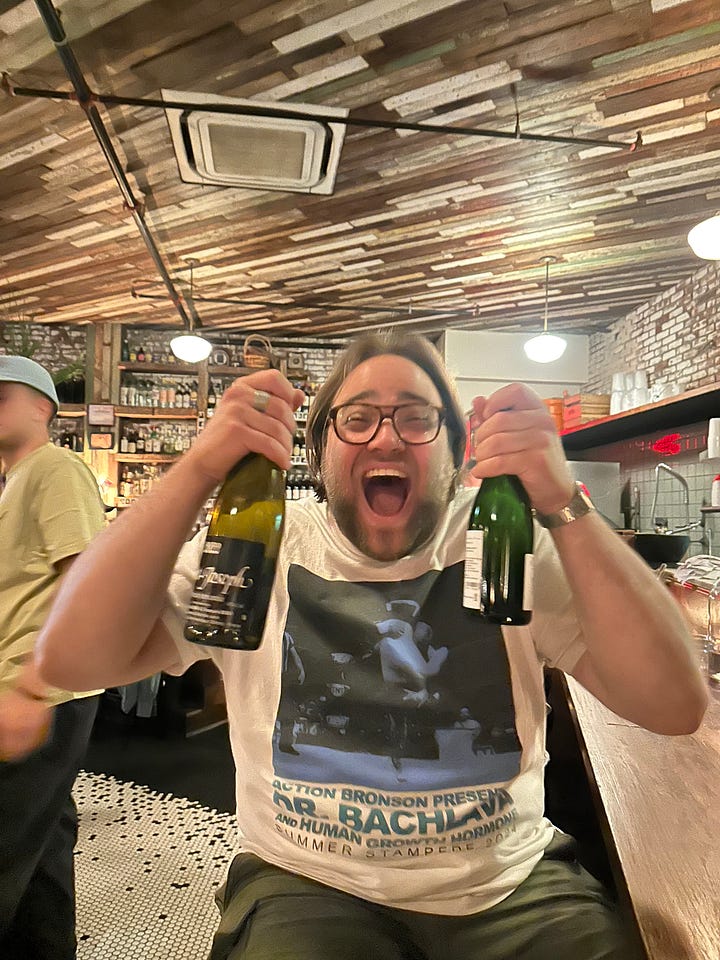
Dustin: In LA, I love Stir Crazy—thoughtful dishes and a champagne-heavy list.
In NYC, Ops is great for cheaper, natural-leaning wine with low markups. Rosella on the Lower East Side does all domestic wines with amazing sushi, local fish, and a great sake list. Lise & Vito in Greenpoint is a fun bar with a great list. Cellar 36 in Chinatown is a wine bar with a great vibe, open till 2 a.m.
Honestly, there are a million amazing wine bars, each with its own vibe.
Chrust: With Others is my holy grail. They know what they’re doing over there. The by-the-glass list is always great, and their bottle list is always so fun. I haven’t had a bad wine there. Keith and Shanna know what they’re doing and I respect the shit out of them. Winona’s is also a hard hitter for me: killer list, killer food, girl dinner sanctuary. Go and ask for a Caleb Leisure bottle (shameless plug). Most affordable, solid wine list—everyone in the city will tell you to go to Ops. And if the trek is too much, go to Leo and get the Caesar. Best caesar in the city. A secret affordable wine list is at Ho Foods. Get their B.N.S. Set for Two and a bottle. It’s a perfect dinner and something about their single laminated wine list is so perfect, I’m beside myself every time. The obvious list, and rightfully so, The Four Horsemen. Everything about Four Horsemen is worth it.
What’s your favorite region/grape/bottle right now?
Princie: The last bottle I drank that I really really loved was from the Jura region in France. It was the “L’Uva Arboisiana” 2023 vintage by Domaine La Tournelle. It’s made from the grape ploussard, which is a thin-skinned red wine grape native to the Jura. I can’t tell you how magical this thing tasted. It was so light and ethereal, but somehow so concentrated in flavor. Literally tasted like homemade strawberry jam and bursting red berry juice gushers. Sooo sexy sooo yum.
Dustin: I’m really into domestic producers working with native grapes.
Recently at a (Anything But Vinifera), I met:
NOK in New Hampshire—great with indigenous and hybrid grapes.
Commonwealth Crush in Vermont.
Dear Native Grapes in upstate NY.
They’re making beautiful wines with lesser-known grapes. I think it’d be cool if more people drank this stuff.
Chrust: On the record: I have no favorite child.
Off the record my favorite child at the moment is probably the stuff coming out of Japan. It fulfills two ends of the spectrum, which I find so reflective of Japanese culture. They come at you with crazy hybrid grapes you’ve never heard of with insane names, or the most beautifully crafted pinot noir you’ve ever had. Swiss wines are also making their way to New York in a big way, and I’m on board.
The bottles I’ll grab at release every year are going to be the Els Jelipins. When I knew nothing about wine, my friend opened a Jelipins rosé for me at Frenchette, and I never looked back. She was my gateway into wine and I love her for it.
You’re bringing a bottle to a friend’s dinner party. Where are you going to shop?
Princie: Since I work at a wine shop, I get a cheeky little employee discount, so I tend to do most of my wine shopping there. But if not Domaine, I’m usually at Psychic Wines in Silver Lake.
Dustin: Fiasco! in Crown Heights is my go-to. Franklin Wines & Spirits has a great selection, including spirits and hard-to-find Amaros. Astor Wines has everything you could ever imagine from natural wines to the classics. Simple Syrup on Nostrand is a great tiny store and they’re super nice!! Thirst in Fort Greene is one of NYC’s OG natural wine shops. Nick there is awesome, and they're super welcoming whether you want to chat or just grab a bottle.
Really, find a shop that’s close, accessible, and cool to you. Just be excited!
Chrust: If you’re in the city: Wine Therapy
If you’re in north Brooklyn: Henry’s
If you’re in south Brooklyn: Thirst
If you have time and energy: Chambers
If you don’t drink: Spirited Away (Get the Unified Ferments Jasmine Green Tea)
Any other tips or tricks?
Princie: One of the most helpful tips if you feel lost in a wine shop is shopping by importer! Importers are the connective tissue between winemakers around the world and your local wine shops/restaurants. Importers have a portfolio of winemakers that they represent to distribute among retailers. Just like how furniture design studios have distinct stylistic identities, wine importers are the same.
If you turn to look at the back of a bottle, the importer’s name and/or logo is always going to be there. Let’s say you drank 3 wines, and you found they were all imported by Zev Rovine Selections, then there’s a pretty good chance that you’ll like other stuff ZRS brings in, even if you have no idea who the winemaker is. Some importers I really like are Percy, ZRS Zev Rovine, Camo and Co., Roni Selects to name a few.
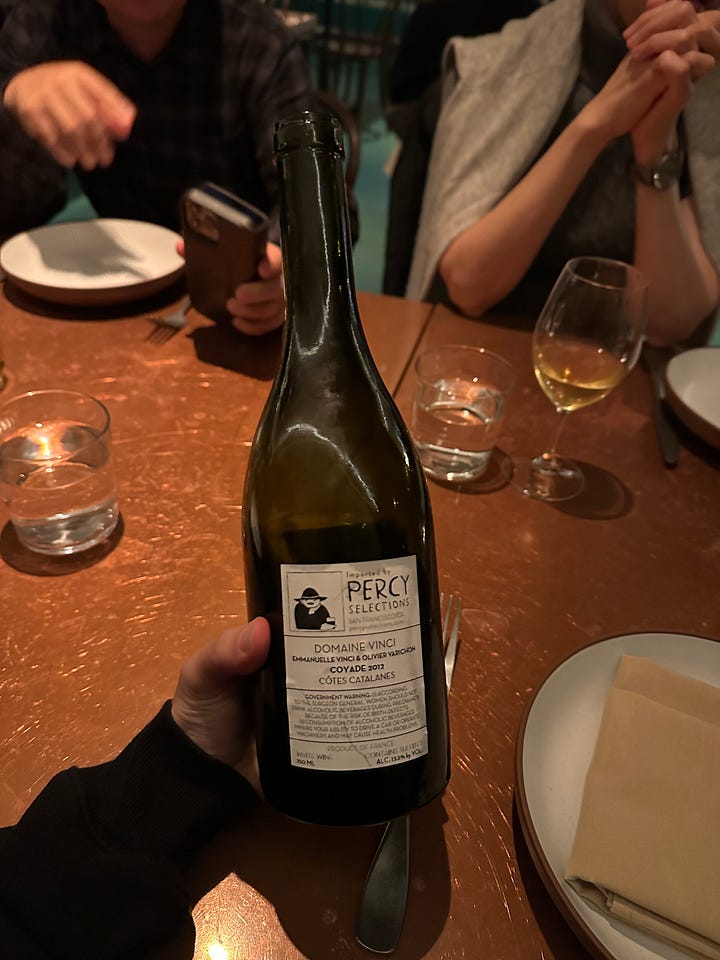
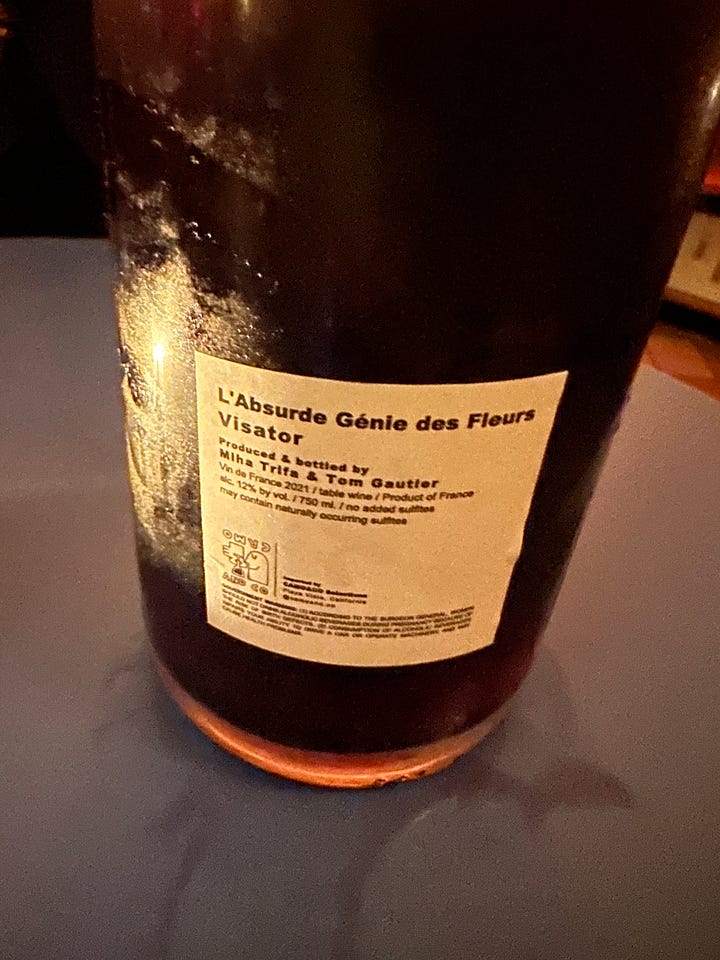
Dustin: If you’re into wine, drink as much of it as you can. Life’s too short—try everything. Talk to people, form relationships with your servers and wine shop folks. That’s how you build your own relationship to wine.
We’re all just chatting and yapping about it anyway. If you’re down to yap, that’s all we want.
Chrust: Despite all the advances in technology winemaking has largely stayed the same, and for good reason. People need an excuse to gather and be together and that’s what wine is about. Wine is so incredibly romantic and beautiful to me. The amount of labor and love that goes into making a bottle is often forgotten. I’ve spent hours and hours stomping grapes, touching grapes, shoveling grapes and moving grapes. And the one thing that Caleb told me last year during harvest is that “the grapes remember.” There are tools and machines that’ll do all these things for you, but he insisted that I get on a stepladder and get into a two thousand pound vat of grapes to do it myself. He said that if I did it myself, I’d be able to feel how the grapes change over time. After a few weeks, I couldn’t have cared less about feeling how the grapes changed, but it was worth it. I remember the grapes and the grapes remember me. It’s romantic and beautiful, and I just want the people in my life to partake in that romance with me.
The Takeaways…
Princie: At the end of the day, wine isn’t that complicated. As long as you’re drinking something you think is tasty and you’re having a good time, that’s all that really matters.
Dustin: If there’s one takeaway: if you like wine, drink wine. Anything you want. Try stuff. Talk about it. Hang out. Get drunk. Eat food. That’s literally the point. Have fun.
Chrust: At the end of the day it’s really about being able to share something with people you love. That’s the high you get from wine. It’s about getting together with your friends and opening a bottle and complaining about all the things in life there are to complain about. It’s about celebrating the highs and drowning in the lows and there’s nothing that captures that better than wine. I think it’s beautiful and romantic and timeless and awesome and fun.




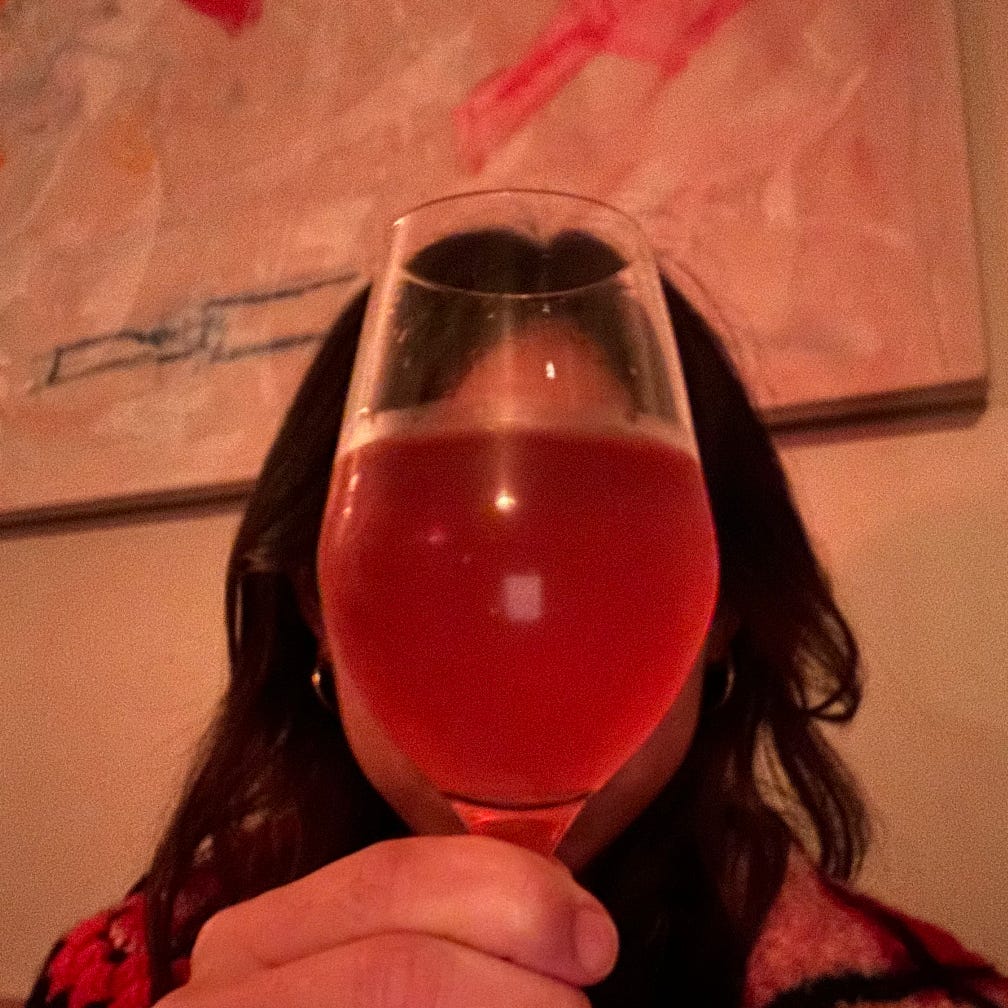


Loved every second of this 🍷
ops superiority